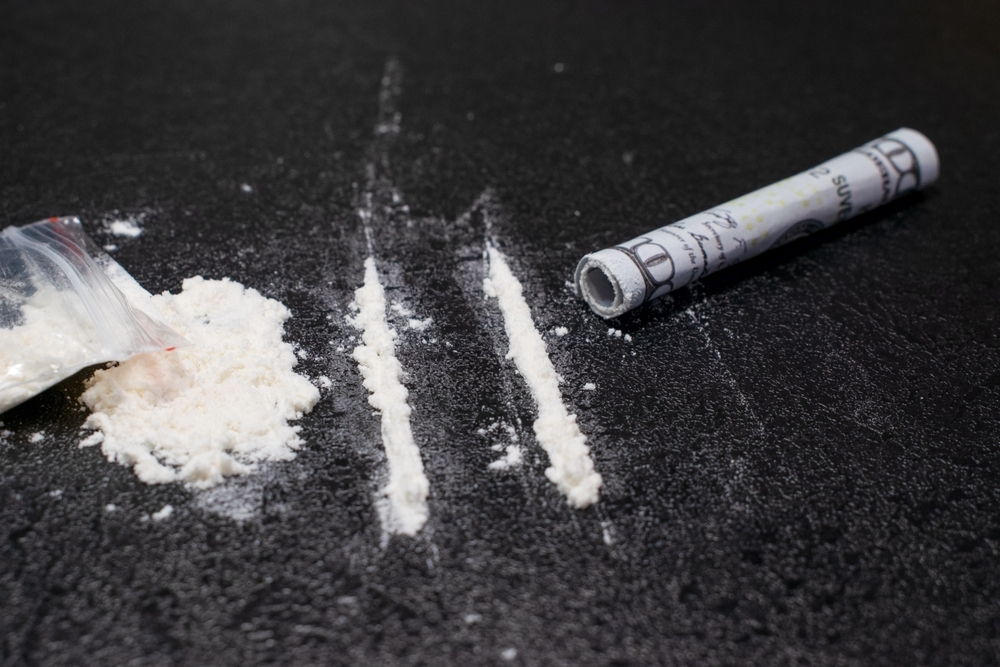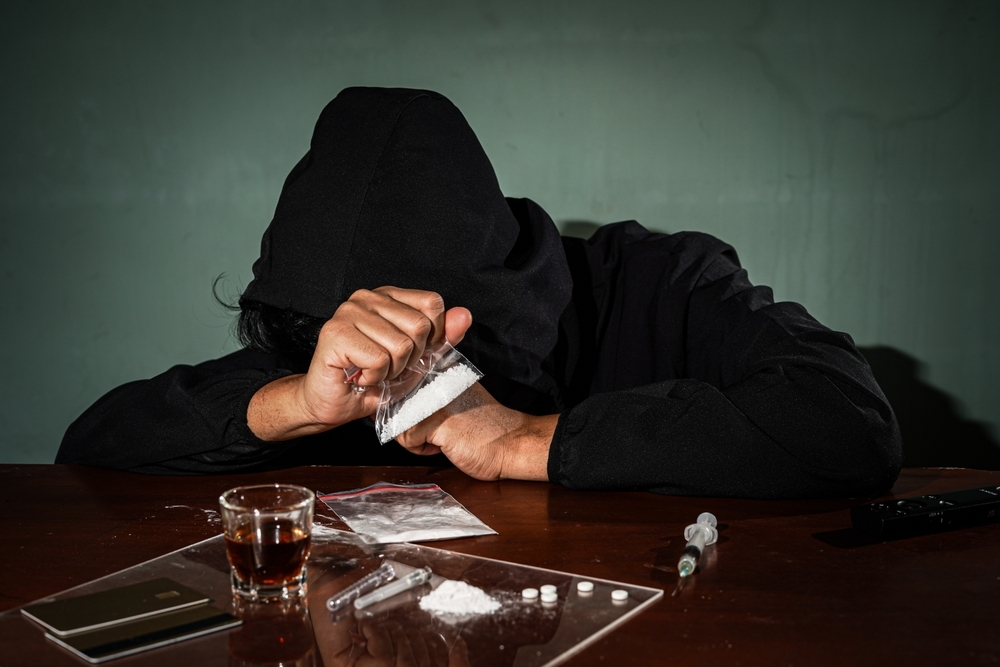Last Updated:
October 20th, 2025
For an estimated 22 million global users, cocaine undoubtedly stands as one of the most addictive substances of all. While every person’s own substance addiction can feel like the hardest to escape, cocaine has especially potent effects that make relapse feel inescapable.
This article explores the neurological, psychological and physical mechanisms that make cocaine so addictive, along with the symptoms and challenges inherent to cocaine addiction.
What is cocaine?
Cocaine is a powerful stimulant drug derived from the leaves of a coca plant (Erythroxylum coca). The extracted substance is processed into two primary forms:
- Cocaine hydrochloride: This appears as a fine, white, odourless powder with a bitter taste, commonly snorted or dissolved and injected.
- Crack cocaine: Powder cocaine is combined with ammonia or baking soda to create small “rocks” with a white, off-white or yellowish tint. The end product is crack cocaine, taken by heating and smoking.
Both forms are extremely addictive and have powerful effects on the body and mind. The high felt after taking cocaine comes rapidly, with a surge of energy levels and feelings of “euphoria” and “dissociation.”
So, what are the powerful driving forces felt in the body and mind after taking cocaine?
What makes cocaine so addictive?
Long-term cocaine use, both in powdered and crack form, causes profound changes in brain chemistry and structure. These alterations reinforce drug-seeking behaviour and lay the foundation for intense cravings, making quitting incredibly difficult.
Cocaine’s effect on dopamine levels in the brain
One of the greatest drivers of cocaine’s addictive nature is the way it impacts dopamine. Dopamine is your brain’s primary pleasure and reward neurotransmitter, carrying messages between neurons and muscles.
Cocaine quickly blocks dopamine transporters (DAT) and prevents dopamine reabsorption in your body. This leads to a rapid buildup in the neurotransmitter, flooding the body with euphoric feelings and surging energy.
Chronic cocaine use damages your brain’s natural ability to manage dopamine. Research shows how these alterations contribute to mood disorders, anhedonia (inability to feel pleasure) and compulsive drug-seeking behaviour to “chase” previous highs. Dopaminergic influences and disruptions make cocaine addiction notably difficult to escape.
Cocaine’s influence on serotonin and norepinephrine
Beyond dopamine, cocaine also causes disruptions in serotonin and norepinephrine levels. Serotonin is linked with the body’s production of dopamine, acting as a brake against dopamine-driven compulsion.
Cocaine causes a spike in serotonin levels, which temporarily enhances your mood but ultimately depletes reserves. The cocaine “crash” as it leaves your system can be particularly uncomfortable, resulting in anxiety, depression and emotional instability.
Cocaine’s link with increased risk-taking behaviour
Research into cocaine use disorders (CUDs) highlights how people who frequently take cocaine are more likely to engage in risk-taking behaviours. Though the exact drivers of heightened risk-taking are not conclusive, they could stem from a lack of appreciation of danger, a greater reward salience or another deficit in risk-related processing. Risk-taking behaviour for a cocaine user might include driving faster, feeling “invincible” in the face of danger or sharing needles.
Psychological research shows how this can be especially pertinent in younger people. Younger people who take cocaine are more likely to engage in risky behaviours. A young person may more quickly disregard the repercussions of developing a drug addiction, creating a vicious cycle where they take more, and the consequences are overlooked until it’s too late.
Cocaine use with other drugs
In addition to the psychological effects on the brain, cocaine is commonly seen as a type of “club drug.” For many people, cocaine is a part of a night out in a club, bar or other social setting. It’s frequently taken alongside amphetamines or alcohol, which are addictive in their own right. A person might positively associate cocaine with other substances, leading to more urges to return to the drug until they’re dependent on cocaine to have a “fun” night out.
What are the effects of cocaine addiction?
Cocaine addictions can develop quickly compared to many other substances. Cocaine’s effects occur almost instantly, making a person feel euphoric, more mentally alert, talkative and energetic.
We may broadly categorise the cluster symptoms of cocaine addiction into physical and psychological categories.
Physical symptoms of cocaine addiction
The short and long-term physical symptoms of cocaine addiction can be life-threatening. Some of the physical symptoms can include:
- Constricted blood vessels: Cocaine is a powerful vasoconstrictor, meaning that it causes the walls holding blood vessels to narrow. This can cause impaired blood distribution around the body.
- Nosebleeds and nasal infections: In addition to blood vessel walls in the body, the mucous membranes in your nose and mouth become damaged, affecting breathing and risking infections.
- Chest pains and heart disease: Cocaine raises a person’s heart rate and blood pressure, affecting your heart’s regularity and can potentially lead to a heart attack. Research from 2024 suggests almost 10% of substance abuse-related cardiovascular disease deaths in the U.S. relate to cocaine use.
- Rapid weight loss: Cocaine affects your gastrointestinal system, so severe upsets to your stomach can majorly reduce your appetite. Prolonged use causes ischemic colitis, leading to serious issues with the basic function of digesting food.
- Severe insomnia: A healthy balance of both dopamine and serotonin is needed as part of your sleep-wake cycle. Impairments and imbalances caused by cocaine can lead to massively disrupted sleep, which affects the body in a plethora of ways.
Psychological symptoms of cocaine addiction
The psychological symptoms of cocaine addiction can be slightly harder to measure but equally, if not more, devastating to your life. When psychological symptoms take a deep root, professional support or interventions may become paramount before they reinforce drug-seeking behaviour that cannot be overcome.
Some of the psychological symptoms of cocaine addiction include:
- Mood swings and mood disorders: Cocaine is known to produce psychiatric symptoms with prolonged use. A person with a cocaine use disorder experiences intense and sudden emotional shifts which compound feelings of instability.
- Panic attacks: Chronic cocaine use overstimulates the body’s central nervous system. Sudden episodes of extreme fear, rapid heartbeats and breathlessness can be common for people with a cocaine use disorder.
- High anxiety and paranoia: As cocaine impairs dopamine and norepinephrine levels, irrational fears can devastate a person’s well-being and their relationships with others.
- Aggression and violent outbursts: A person becomes more prone to impulsivity and violent outbursts when addicted to cocaine. Research suggests that up to 55% of people with cocaine-related psychiatric symptoms have exhibited violent behaviour. The data also associates up to 22% of suicide victims having a cocaine use disorder.
I need help removing a cocaine addiction from my life
Cocaine addiction can take hold quickly and ruthlessly. If you or a loved one has resonated with the points raised today and needs treatment for drug addiction, know that there is support out there available.
Here at UKAT, we provide medical detox to help you manage withdrawal symptoms. Our tailored rehab programmes help with both physical and psychological struggles, with help available at all times. Our expert team delivers practical and holistic therapy programmes like cognitive behavioural therapy (CBT) to give you lifelong tools to fight the urge to relapse.
Overcoming cocaine addiction starts with a single step. Contact us today to begin your drug treatment journey and regain control over your life.
(Click here to see works cited)
- Number of People Who Use Cocaine Worldwide by Region 2010-2021 | Statista, www.statista.com/statistics/264738/number-of-worldwide-users-of-cocaine-by-region
- “Apa PsycNet.” American Psychological Association, American Psychological Association, psycnet.apa.org/record/2015-23647-001.
- “Dopamine Transporter.” Dopamine Transporter – an Overview | ScienceDirect Topics, www.sciencedirect.com/topics/neuroscience/dopamine-transporter
- Morton WA. Cocaine and Psychiatric Symptoms. Prim Care Companion J Clin Psychiatry. 1999 Aug;1(4):109-113. doi: 10.4088/pcc.v01n0403. PMID: 15014683; PMCID: PMC181074.
- Desrochers SS, Spring MG, Nautiyal KM. A Role for Serotonin in Modulating Opposing Drive and Brake Circuits of Impulsivity. Front Behav Neurosci. 2022 Feb 17;16:791749. doi: 10.3389/fnbeh.2022.791749. PMID: 35250501; PMCID: PMC8892181.
- Gowin JL, May AC, Wittmann M, Tapert SF, Paulus MP. Doubling down: increased risk-taking behavior following a loss by individuals with cocaine use disorder is associated with striatal and anterior cingulate dysfunction. Biol Psychiatry Cogn Neurosci Neuroimaging. 2017 Jan;2(1):94-103. doi: 10.1016/j.bpsc.2016.02.002. PMID: 28164168; PMCID: PMC5283863.
- “Cocaine Increases Risky Behaviors, Depending on Your Age.” Psychology Today, Sussex Publishers, www.psychologytoday.com/us/blog/motivated-behaviors/202205/cocaine-increases-risky-behaviors-depending-on-your-age
- Parsons JT, Grov C, Kelly BC. Club drug use and dependence among young adults recruited through time-space sampling. Public Health Rep. 2009 Mar-Apr;124(2):246-54. doi: 10.1177/003335490912400212. PMID: 19320366; PMCID: PMC2646481.
- “Vasoconstriction: Medlineplus Medical Encyclopedia.” MedlinePlus, U.S. National Library of Medicine, medlineplus.gov/ency/article/002338.htm
- Temporal Trends in Substance Use and Cardiovascular …, www.ahajournals.org/doi/10.1161/JAHA.123.030969
- Haasen C, Prinzleve M, Gossop M, Fischer G, Casas M. Relationship between cocaine use and mental health problems in a sample of European cocaine powder or crack users. World Psychiatry. 2005 Oct;4(3):173-6. PMID: 16633544; PMCID: PMC1414771.
- Morton WA. Cocaine and Psychiatric Symptoms. Prim Care Companion J Clin Psychiatry. 1999 Aug;1(4):109-113. doi: 10.4088/pcc.v01n0403. PMID: 15014683; PMCID: PMC181074.



